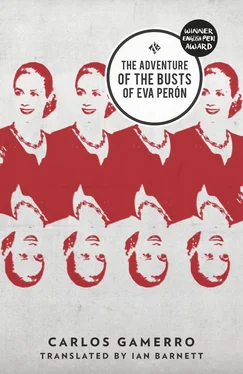‘I only saw her up close once. She came to visit us for the opening of the union building, and she dazzled us all, even the communists and socialists who’d sworn they weren’t going to greet her. She was wearing a wasp-waisted dress,’ he said, looking at the little girl, ‘in crimson brocade with gold thread and long sleeves, and a silk skirt embroidered with silver, and her hair was loose — just like spun gold it looked — all the way down to her waist.’
‘Was she like a princess, Granpa?’ she asked him.
‘Yes, but a princess of the people. Anyway, what stunned us most was her whiteness… I’ve heard her compared with magnolias and jasmines and snow, but she was different. White, translucent, yet with an inner fire. Like a flame burning in an alabaster lamp. Look, to give you some idea… When she arrived, we’d just finished lunch, so we offered her some red wine. She took the glass with a smile and drank it right down. You could see she had a thirst on her. And her whiteness was so pure we could all see the wine run down her throat, and we stood there and marvelled. Perón was opaque, always had been. The time I sculpted him, I did him in black granite. But Eva was so transparent… Through her skin… shone the people,’ he concluded, looking straight at Marroné with his kind, dark eyes. ‘I tried to put all that into this sculpture,’ he said, turning to the swan-necked Eva. ‘But it’s only a partial success.’
‘How much?’ asked Marroné, cutting him short lest the whole story be a ruse to bump up the price.
‘I wasn’t thinking of selling it, Ernesto. Not for now.’
Marroné’s eyes were as hard and bright as the obsidian of an Aztec priest’s dagger. Tethered for days, the Tamerlán & Sons head of procurement roared inside him like a caged tiger with an empty stomach.
‘Just name your price. And for ninety-one others too,’ he said, sweating and trembling from head to toe as if he had the fever.
Don Rogelio showed him a wicker chair, and Marroné sat down gratefully.
‘They’re very important to you, aren’t they?’
Marroné nodded with imploring eyes, his Adam’s apple pumping like a piston with every gulp.
‘The poor children of the shanties…’ he began.
‘But I don’t see how I can help you. I’m a carver, I make one-offs, originals. What you need is someone who can mass-produce them.’
He would have grabbed him by the lapels and shaken him if he’d had any.
‘I need those busts! I don’t care how! I don’t care if they’re made of papier mâché, tin foil or plasticine!’
The two children had taken refuge behind their grandfather again. Marroné slumped back in his chair, his every limb trembling.
‘Forgive me.’
Don Rogelio kept his benevolent eyes fixed on Marroné’s.
‘Right, children, off you go, I think I can hear your mummy.’ He sent his grandchildren away with a pat on each of their bottoms, then turned to Marroné. ‘Ernesto… you aren’t a Montonero, are you? You aren’t even a Peronist. Do you want to tell me about it?’
Marroné fought an irresistible urge to fall to his knees and kiss his hands.
‘I’m a top executive with a leading construction company,’ he said, beginning his harrowed confession. ‘I realise that, seeing me like this, you may find it hard to believe, but look,’ he fished the bivalve out of his pocket, rummaged in it and pulled out his driver’s licence, his medical insurance card, his San Isidro Athletics Club membership, and spread them out on the workbench to arouse, if not the credulity, then at least the compassion of the man in front of him, but Don Rogelio stopped him with an outstretched hand.
‘It’s alright, Ernesto. I have no reason to doubt your word. If you say so, I believe you.’
Marroné felt his eyes flood with tears.
‘It’s just that I lied to you before.’
‘Well, I suppose you had your reasons.’
He nodded dumbly, gulping back the snot.
‘The Montoneros have kidnapped the president of the company. He’s a good man, but he’s had some… er… bad press lately. One of the conditions for his release is that we put a bust of Eva in every office. That makes ninety-two busts in all. I’ve been hunting for them for weeks, but powerful forces have been moving against me,’ he babbled, because it was no longer the old Marroné talking, but the paranoid bag of shredded nerves the events of the last few days had turned him into. ‘Help me, please, Don Rogelio. I don’t know who else to turn to. Even if you just made me one or two little sample busts, it would buy us some time…’
Don Rogelio had pulled a half-smoked cigar out of his shirt pocket and lit it with an old petrol lighter; it was a cheap, foul-smelling cheroot and he chewed on it with manifest delight.
‘Here’s what I suggest. You get yourself bathed, changed and have a lie-down for a while till lunchtime. And after something to eat, when you’ve got your strength back, we’ll carry on talking. What do you say?’
Marroné nodded, still more disbelieving than frankly grateful, and followed Don Rogelio through the garden, the multicoloured strip curtain and the kitchen to the master bedroom, which contained a double bed, a wardrobe, a crucifix and olive branch, and a photo of Don Rogelio as a young man embracing a smiling, even younger woman in a floral dress. From the wardrobe his host produced a pair of trousers, clean and pressed, and a freshly ironed shirt, some thick cotton underpants and a pair of flip-flops.
‘I’m giving you the flip-flops because all of my shoes will be too big for you. Let’s see, what else…’ He reached up to the top shelf for a clean towel. ‘I think that’ll do for now,’ he said, laying it on the pile on the bed.
Marroné looked on with the wariness of a little boy accustomed to each display of affection being the prelude to a slap; but after his shower with hot water and lots of soap, and the clean clothes, he felt his optimism and his faith in his fellow man rise in him again like the dawn of a new age. He felt even better when, after a deep, refreshing sleep, Don Rogelio’s two grandchildren burst into the room giggling and shook him awake without showing the slightest sign of fear.
Saturday was family lunch day at Don Rogelio’s. He had so many children (nine, only counting the ones still living) that they came in two contingents: one on Saturday, another on Sunday, depending on work and commitments. The children’s mother had put a giant pan of water on to boil and was slicing tomatoes for the sauce; then one of her sisters arrived, with her numerous offspring in tow and a husband staggering under a tower of boxes of ravioli that reached his nose. Marroné was introduced to everyone as they arrived and helped set up, under the combined shade of the fig tree and the vine, the table of trestles and planks, which the women laid with vinyl tablecloths. Grim as the conversation was, ranging from the repression in the factories to the growing daily death toll or the recent botched coup attempt by the military, the atmosphere was generally festive and light-hearted: seated at the head of the table and flecked with dancing flashes of green and gold, Don Rogelio was a sun around which his children orbited like planets and his grandchildren like moons. For a moment the memory of the cheerless Sunday barbecues with his in-laws in the back garden of the house in Olivos came flooding back to Marroné, every one of them an instalment in the unpayable debt he’d incurred by accepting their contribution to the purchase of the house and swimming pool: the puckered face of his father-in-law every time he tried the meat his son-in-law had cooked, his wife and mother-in-law’s endless confabs, withdrawing as soon as they’d finished eating to discuss matters of child-rearing, and abandoning him to the interminable postprandial prattle of his gorilla father-in-law.
Читать дальше











